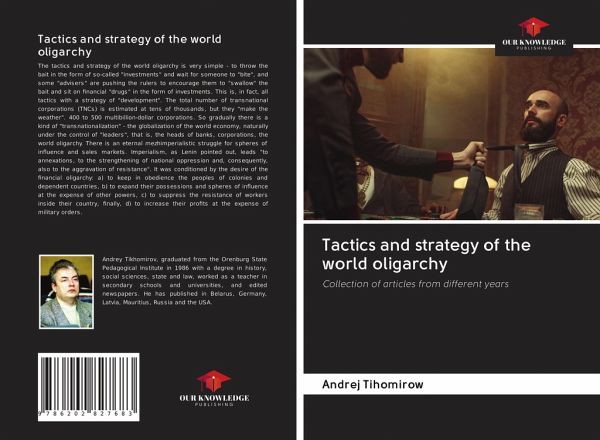
Tactics and strategy of the world oligarchy
Collection of articles from different years
Versandkostenfrei!
Versandfertig in 1-2 Wochen
18,99 €
inkl. MwSt.

PAYBACK Punkte
9 °P sammeln!
The tactics and strategy of the world oligarchy is very simple - to throw the bait in the form of so-called "investments" and wait for someone to "bite", and some "advisers" are pushing the rulers to encourage them to "swallow" the bait and sit on financial "drugs" in the form of investments. This is, in fact, all tactics with a strategy of "development". The total number of transnational corporations (TNCs) is estimated at tens of thousands, but they "make the weather". 400 to 500 multibillion-dollar corporations. So gradually there is a kind of "transnationalization" - the globalization of t...
The tactics and strategy of the world oligarchy is very simple - to throw the bait in the form of so-called "investments" and wait for someone to "bite", and some "advisers" are pushing the rulers to encourage them to "swallow" the bait and sit on financial "drugs" in the form of investments. This is, in fact, all tactics with a strategy of "development". The total number of transnational corporations (TNCs) is estimated at tens of thousands, but they "make the weather". 400 to 500 multibillion-dollar corporations. So gradually there is a kind of "transnationalization" - the globalization of the world economy, naturally under the control of "leaders", that is, the heads of banks, corporations, the world oligarchy. There is an eternal mezhimperialistic struggle for spheres of influence and sales markets. Imperialism, as Lenin pointed out, leads "to annexations, to the strengthening of national oppression and, consequently, also to the aggravation of resistance". It was conditioned by the desire of the financial oligarchy: a) to keep in obedience the peoples of colonies and dependent countries, b) to expand their possessions and spheres of influence at the expense of other powers, c) to suppress the resistance of workers inside their country, finally, d) to increase their profits at the expense of military orders.












